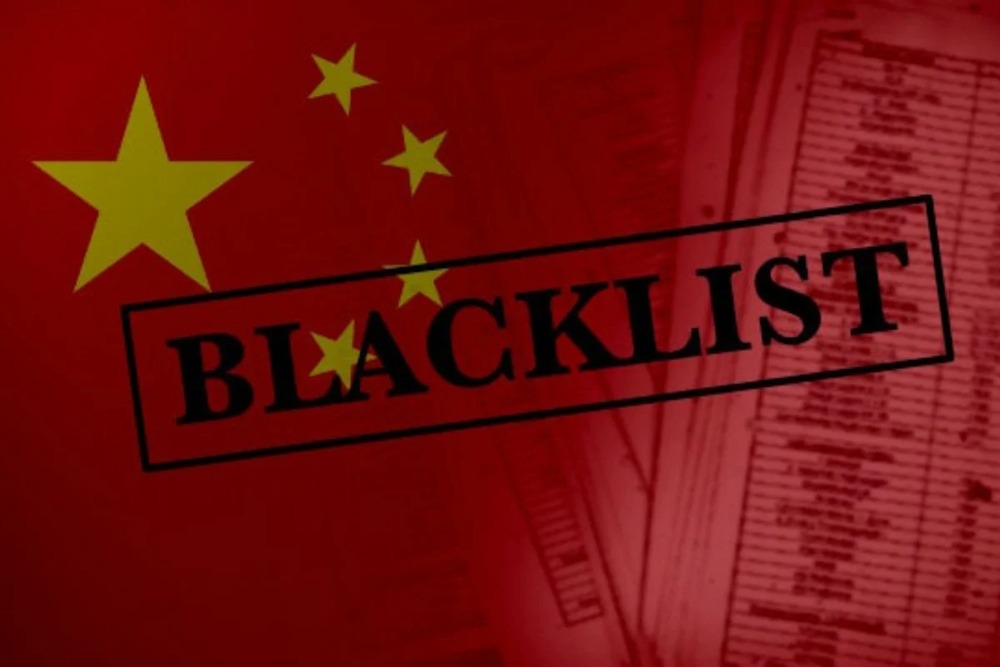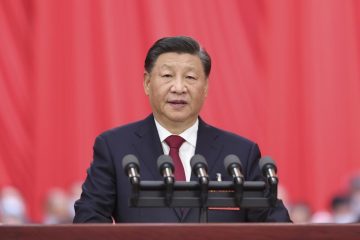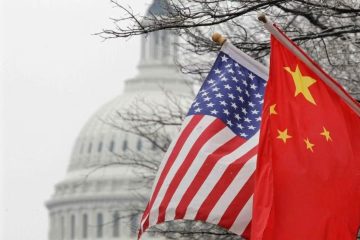China Prepares a Trade War Against U.S. Companies

China has prepared a comprehensive strategy targeting U.S. companies amid escalating trade tensions. Since the onset of President Trump’s initial trade conflict with China, Beijing has developed a comprehensive array of strategies designed to target vulnerabilities in the U.S. economy. The company is poised to fully deploy those tools shortly. On Wednesday, China announced a significant increase in tariffs on all U.S. imports, raising the rate to 84%. This move comes in direct response to the new U.S. tariffs on Chinese imports, which have been set at 104% and took effect at midnight. However, analysts suggest that China may have additional strategies at its disposal beyond this tariff escalation.
In the ongoing trade dynamics, Trump has prioritized tariffs as a primary tool, whereas China adopts a more multifaceted approach. This strategy not only includes the implementation of its own tariffs but also capitalizes on the attractiveness of the Chinese market for American businesses. A key focus of the analysis is the strategy to impose challenges on businesses that rely on their connections with the world’s second-largest economy.
Beijing has implemented a range of tools that it may expand, including export controls on critical materials utilized by American companies for chip manufacturing and defense-related products. Additionally, regulatory investigations have been employed to intimidate and penalize U.S. firms, while blacklists have been established to prevent American businesses from engaging in sales to China. Furthermore, regulatory bodies are strategizing new methods to compel American firms to relinquish their valuable intellectual property or face restrictions on their access to the Chinese market.
The toolbox highlights leader Xi Jinping’s ability to sustain an extended economic conflict with the United States. As the two capitals seem to trend toward decoupling, the situation underscores the increasing risks faced by U.S. companies engaged in operations, investments, or trade with China. “China has strategically assembled a new arsenal of tools designed to reduce costs for itself while increasing challenges for the United States,” stated Evan Medeiros, a former senior national-security official during the Obama administration and currently a professor at Georgetown University. “They have positioned themselves strategically to gain an asymmetric advantage in the ongoing trade war.”
China’s government and state media have adopted a resolute stance, with the Commerce Ministry declaring, “If the U.S. insists on its own way, China will fight to the end.” The latest tariffs imposed by Trump on China officially took effect shortly after midnight on Wednesday. The recently imposed 104% tariff on all Chinese imports during Trump’s second term will compound the existing tariffs, resulting in an average total tariff rate on China approaching 125%. On Wednesday, China’s Foreign Ministry announced that following the official implementation of the new rate, Beijing is prepared to implement robust measures to safeguard its national interests. However, the ministry also indicated a willingness to engage in negotiations, provided they are conducted on the basis of equality, respect, and reciprocity. China’s Ministry of Commerce has highlighted that the United States has consistently maintained a trade surplus in services with China, which reached $26.6 billion in 2023.
Beijing is expected to avoid certain options for the time being, as the potential costs to China could be significant. Such actions may involve a significant devaluation of the yuan or a strategic reduction in its U.S. Treasury holdings. The potential repercussions of both actions may lead to instability within China’s financial market, undermining its strategic objective of enhancing trade relations with other nations. In recent weeks, Chinese officials have engaged with several Southeast Asian nations, including Cambodia, Laos, and Thailand, in an effort to enhance trade relations and promote the use of the Chinese yuan for transaction settlements, as reported by sources familiar with the developments. In recent discussions, sources have revealed that Chinese officials are keen on maintaining the stability of the yuan as part of their strategy to promote “de-dollarization” and increase trade conducted in yuan.
Tensions between Beijing and Washington continue to escalate, with each successive round of tariff increases imposed by Trump prompting retaliatory measures from Xi’s administration against the United States. The initial optimism of the Xi leadership regarding negotiations with the new administration has shifted to a sentiment of frustration and anger. China’s recent countermeasures reflect a heightened emphasis on directing efforts toward U.S. companies, particularly those involved in advanced technology sectors. Amid escalating tensions with Washington, Beijing remains focused on leveraging the appeal of the Chinese market for businesses, even in light of recent economic sluggishness, while simultaneously striving to secure a competitive edge in technology.
Despite a significant decline in new foreign direct investment in China over the past few years, recent surveys indicate that a variety of multinationals, including car manufacturers, pharmaceutical firms, and semiconductor companies, are opting to maintain their presence in the market. Companies are facing heightened vulnerabilities due to the risks associated with China. A recent report from the U.S. Chamber of Commerce Foundation reveals that a significant majority of approximately 200 American companies surveyed over the past few years consider China to be their primary source of geopolitical risk.
Beijing has been leveraging its antimonopoly regulations as a strategic instrument to further its geopolitical objectives. For example, several merger agreements that had the potential to enhance the prospects of U.S. companies, including Intel’s intended acquisition of Israel’s Tower Semiconductor, did not materialize due to delays in approval from Chinese regulators. In a significant development following President Trump’s recent tariff measures, China initiated an antitrust investigation into DuPont’s operations within the country last week. This move comes as DuPont reported that 19% of its revenue was generated from mainland China and Hong Kong last year, although the Chinese authorities have not provided extensive details regarding the rationale behind the probe.
China’s antitrust regulator is currently examining a transaction that would transfer control of two ports in Panama from CK Hutchison, which is overseen by the family of Hong Kong billionaire Li Ka-shing, to a consortium of investors spearheaded by BlackRock. Despite the absence of any companies or assets in mainland China, the investigation by Beijing poses a risk of delaying the deal, which has emerged as a contentious issue in U.S.-China relations. Beijing has introduced a significant trade tool known as the unreliable-entity list, which mirrors a similar list maintained by the U.S. This list restricts foreign companies and individuals considered detrimental to national security from engaging in business with American firms. In a significant move, China has placed Lockheed Martin and Raytheon Missiles & Defense on its blacklist in 2023, citing their participation in arms sales to Taiwan.
In 2019, China established a blacklist in response to the United States’ decision to include Chinese telecommunications leader Huawei Technologies on its own list. China has implemented a ban on companies it designates as unreliable entities, prohibiting them from investing within its borders or conducting trade with local firms. These companies will also encounter various restrictions, including entry bans for their essential personnel.
A recent academic study authored by Medeiros from Georgetown University and Andrew Polk, co-founder of the research firm Trivium China, indicates that China’s implementation of the unreliable-entity list has been characterized by a slow and cautious approach—until now. In 2023, the organization began utilizing the tool, specifically including Lockheed Martin and Raytheon Missiles & Defense on its list due to their participation in arms sales to Taiwan. The recent decision has shown minimal effects on both firms, as neither engages significantly in defense-related operations within mainland China. Raytheon-linked commercial subsidiaries in the country remain unaffected by the listing.
In the fall of 2024 and early 2025, Chinese authorities significantly increased the utilization of their entity list, both in terms of frequency and scope, as detailed in a recent paper by Medeiros and Polk, published in the Washington Quarterly journal earlier this week. In a significant development following Trump’s tariff measures, Beijing has expanded its blacklist of U.S. companies. This now includes not only defense-related firms but also major players such as PVH, the parent company of Calvin Klein and Tommy Hilfiger, as well as the U.S. biotechnology company Illumina. PVH has drawn criticism from Beijing following its announcement to eliminate Xinjiang cotton from its production in adherence to U.S. regulations. Meanwhile, Chinese officials allege that Illumina has engaged in lobbying efforts aimed at sidelining its Chinese competitors in certain segments of the U.S. market. As of early this week, reports from Medeiros and Polk indicate that China has placed 38 U.S. entities on its blacklist, with expectations that additional American companies may soon be targeted in the context of escalating competition between the two nations.










